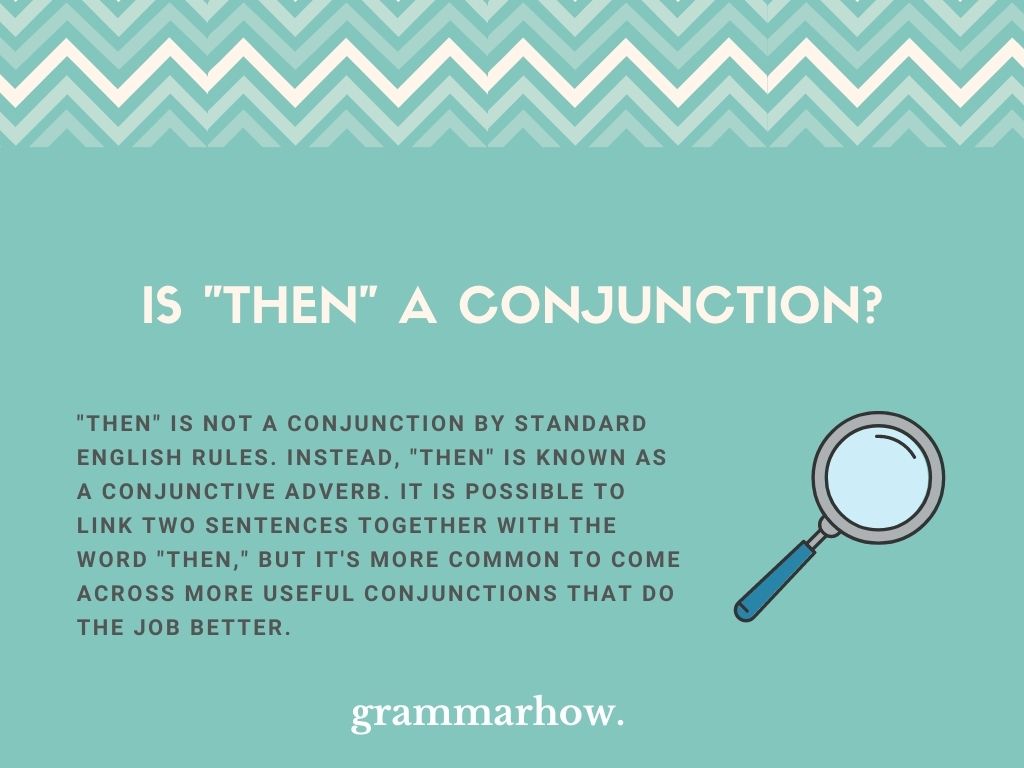Conjunctions are fundamental building blocks for a solid English sentence. To aid your writing skills, it would help to know how they work and what they are. This article will explain whether “then” is a conjunction and how to use it as such.
Is “Then” a Conjunction?
“Then” is not a conjunction by standard English rules. Instead, “then” is known as a conjunctive adverb. It is possible to link two sentences together with the word “then,” but it’s more common to come across more useful conjunctions that do the job better.

“Then” on its own isn’t technically the correct phrase. You should use “and then” whenever you want to correctly conjoin two or more clauses. “And” is the conjunction used when “then” is present.
Take a look at these three examples:
- We went to the shops. We decided to go home.
- We went to the shops, then we decided to go home.
- We went to the shops, and then we decided to go home.
Grammatically speaking, the second sentence does not make sense. “Then” should not come directly after the comma because it is not a conjunction.
Instead, you should have placed a comma after “shops,” thus allowing “then” to start a brand new sentence.
However, in the second example, “and then” allows you to correctly attribute it as a conjunction. The combination of “and” and “then” allows you to use an appropriate conjunctive phrase that joins two sentences together.
In almost all cases, “then” is used synonymously with “next.” It is a way for you to create a list of how certain things might happen.
“Then” As A Conjunctive Adverb
“Then” is a conjunctive adverb. It is put in the same group as adverbs such as “however” and “after all.” You can use it to conjoin two sentences or clauses, but it should only ever come after a semi-colon when used in this fashion.
You can usually recognize a conjunctive adverb acting as a conjunction when a semi-colon comes before it, and a comma comes directly after.
While it is not a conjunction, it still makes sense to include some examples of “then” and when it works best.
- I will do this; then, I will work on whatever comes next.
- I should be able to help you out; then, I will start working on the things that matter most to me.
- I can’t do any of those things without you; then, I suppose that’s why you came to me to ask!
- Please stop that; then, I’ll be able to focus on what we’re actually looking for here.
However, there are better choices when using conjunctive adverbs. It’s very rare to see “then” used in this format.
Is “Then” a Subordinating Conjunction?
“Then” is not a conjunction; therefore, it is not possible to use it as a subordinating conjunction. A subordinating conjunction unites ideas within a sentence. They can link a dependent clause with an independent clause, and their positioning in the sentence is versatile.
The following two examples will demonstrate how a subordinating conjunction works:
- I did not do the homework because of the argument.
- Because of the argument, I did not do the homework.
As you can see, the sentences are identical. “Because” is a subordinating conjunction that can be placed in the middle of the sentence or at the beginning of a sentence.
In both cases, “because” connects an independent clause to a dependent clause, and the meaning is still clear.
To prove that “then” cannot be used as a subordinating clause, you can try the same trick with a sentence containing “then:”
- I did my homework, then I went to bed.
- Then I went to bed, I did my homework.
As you can see, these sentences don’t make any sense! That’s why “then” can never be a subordinating clause.
Is “Then” a Coordinating Conjunction?
“Then” is not a conjunction, but it can sometimes connect two thoughts or independent clauses with each other. Therefore, it is possible to use it as a coordinating conjunction (or, more appropriately, a coordinating conjunctive adverb).
Coordinating conjunctions allow two independent ideas or clauses to connect with each other. You’ll find the most common ones are “and,” “but,” and “so:”
- I will go home, and I will make sure he’s okay.
- You will need him, but I don’t think you know that.
- I can’t have her, so nobody can.
“Then” can do this as well, but only in certain instances.
- You should leave, then I will be happy.
While it is not recognized as a conjunction, it is still possible to use it to coordinate two independent ideas in your writing.
You may also like:
Is “When” A Preposition? Full Explanation (With Examples)
Is ON A Preposition? Here’s The FULL Explanation (+Examples)
Is “Yet” a Conjunction? (Helpful Examples)

Martin holds a Master’s degree in Finance and International Business. He has six years of experience in professional communication with clients, executives, and colleagues. Furthermore, he has teaching experience from Aarhus University. Martin has been featured as an expert in communication and teaching on Forbes and Shopify. Read more about Martin here.
